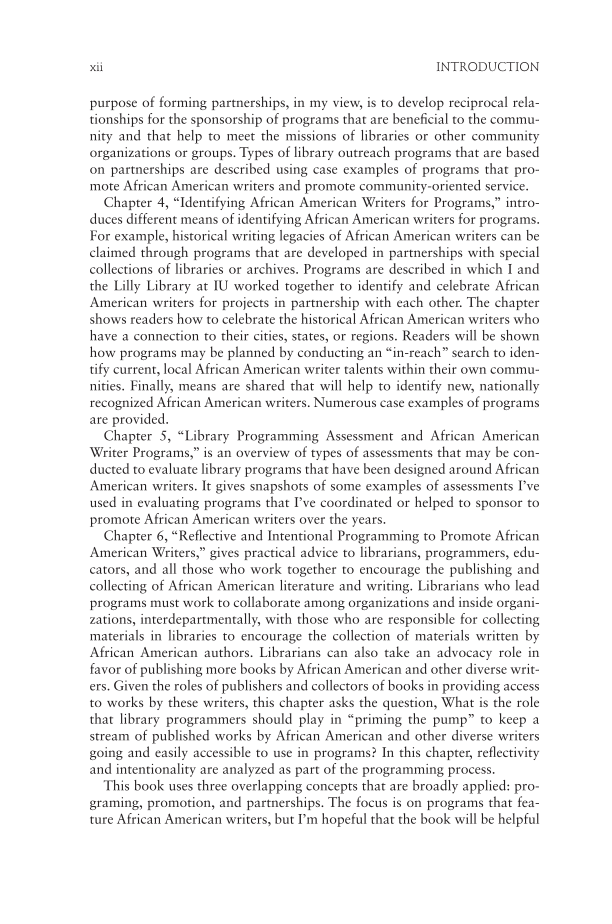xii Introduction purpose of forming partnerships, in my view, is to develop reciprocal rela- tionships for the sponsorship of programs that are beneficial to the commu- nity and that help to meet the missions of libraries or other community organizations or groups. Types of library outreach programs that are based on partnerships are described using case examples of programs that pro- mote African American writers and promote community-oriented service. Chapter 4, “Identifying African American Writers for Programs,” intro- duces different means of identifying African American writers for programs. For example, historical writing legacies of African American writers can be claimed through programs that are developed in partnerships with special collections of libraries or archives. Programs are described in which I and the Lilly Library at IU worked together to identify and celebrate African American writers for projects in partnership with each other. The chapter shows readers how to celebrate the historical African American writers who have a connection to their cities, states, or regions. Readers will be shown how programs may be planned by conducting an “in-reach” search to iden- tify current, local African American writer talents within their own commu- nities. Finally, means are shared that will help to identify new, nationally recognized African American writers. Numerous case examples of programs are provided. Chapter 5, “Library Programming Assessment and African American Writer Programs,” is an overview of types of assessments that may be con- ducted to evaluate library programs that have been designed around African American writers. It gives snapshots of some examples of assessments I’ve used in evaluating programs that I’ve coordinated or helped to sponsor to promote African American writers over the years. Chapter 6, “Reflective and Intentional Programming to Promote African American Writers,” gives practical advice to librarians, programmers, edu- cators, and all those who work together to encourage the publishing and collecting of African American literature and writing. Librarians who lead programs must work to collaborate among organizations and inside organi- zations, interdepartmentally, with those who are responsible for collecting materials in libraries to encourage the collection of materials written by African American authors. Librarians can also take an advocacy role in favor of publishing more books by African American and other diverse writ- ers. Given the roles of publishers and collectors of books in providing access to works by these writers, this chapter asks the question, What is the role that library programmers should play in “priming the pump” to keep a stream of published works by African American and other diverse writers going and easily accessible to use in programs? In this chapter, reflectivity and intentionality are analyzed as part of the programming process. This book uses three overlapping concepts that are broadly applied: pro- graming, promotion, and partnerships. The focus is on programs that fea- ture African American writers, but I’m hopeful that the book will be helpful
Document Details My Account Print multiple pages
Print
You have printed 0 times in the last 24 hours.
Your print count will reset on at .
You may print 0 more time(s) before then.
You may print a maximum of 0 pages at a time.





































































































































































